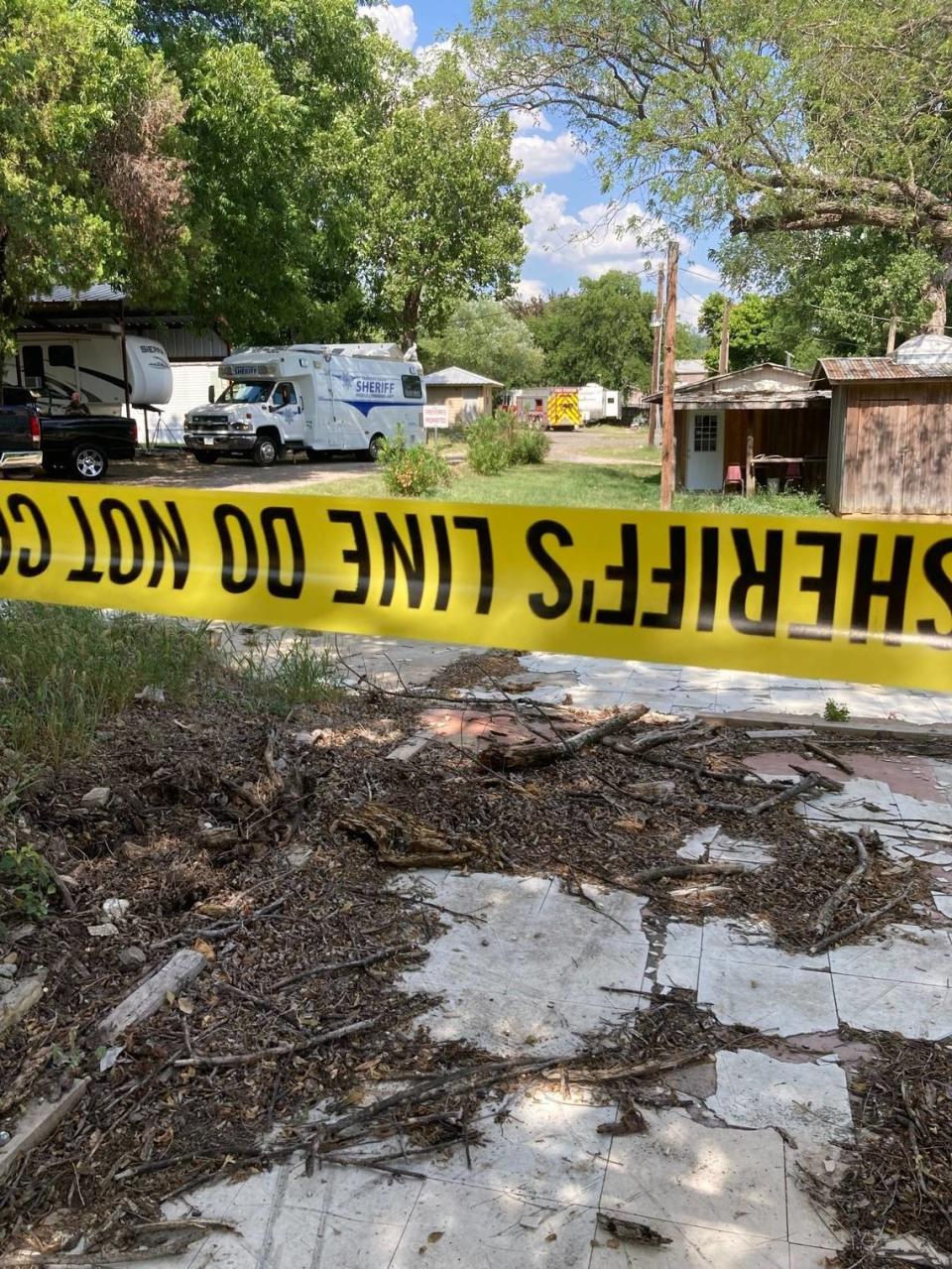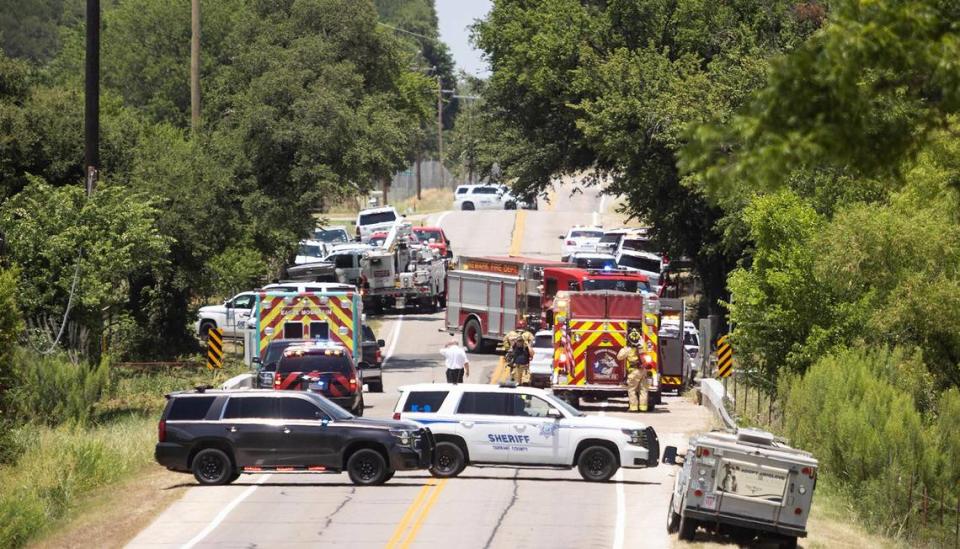Lawsuit alleges Tarrant deputies intentionally set fire, wrongfully killed man in standoff
The family of a North Texas man killed in a standoff with deputies is suing the Tarrant County Sheriff’s Office, alleging that deputies intentionally set a fire at the man’s home while attempting to execute an arrest warrant and then shot him without provocation.
Kemal Shea, 58, was killed by Tarrant County sheriff’s deputies trying to serve the warrant on June 23, 2022, authorities said at the time. The Sheriff’s Office said that Shea started the blaze and shot at deputies before they returned fire. The Tarrant County Medical Examiner’s Office ruled his death a homicide, saying he was killed by a gunshot wound to the neck.
Shea’s family filed their lawsuit in federal court in Fort Worth last month, claiming his death was wrong and unnecessary. The suit alleges that Shea was killed as a result of excessive force, with deputies attempting to arrest him on a two-year-old warrant for aggravated assault with a deadly weapon. It says deputies prevented Shea from leaving his home by starting the fire and stopped fire crews from reaching the residence.
The suit alleges deputies tried to execute the warrant 11 days after Shea reached out to the Sheriff’s Office to file a complaint with its internal affairs investigators regarding alleged sexual harassment and sexual abuse of two women he knew at the hands of unnamed deputies.
The Tarrant County Sheriff’s Office directed requests for comment on the suit to the Tarrant County Criminal District Attorney’s Office. A spokesperson for the DA’s Office told the Star-Telegram it does not comment on pending litigation.
In a response filed with the court on Thursday, an attorney with the civil division of the DA’s Office denied the family’s allegations and wrote that “Kemal Shea Jr. is solely responsible for his death on June 23, 2022. Instead of peacefully surrendering to the officers attempting to serve an arrest warrant, Shea repeatedly shot at various Tarrant County Sheriff’s Office (“TCSO”) employees and other first responders, threw an incendiary device out of his residence (catching the residence on fire), and endangered himself, the officers, and the surrounding public.”
Investigators found multiple guns in Shea’s home, and bullet holes and eyewitnesses accounts are evidence that Shea shot at officers and threw a Molotov cocktail, the attorney representing the Sheriff’s Office wrote.
🚨 More top stories from our newsroom:
→ Fire destroys Baby Dolls strip club in Fort Worth
→ Were tales of the Lake Worth Monster real?
→ Gateway Church settled 2 lawsuits this year
[Get our breaking news alerts.]
Deadly standoff
Deputies arrived at Shea’s home in the 500 block of East Indian Creek Drive around 9:30 a.m. with a warrant for his arrest, authorities said at the time. The home was on unincorporated county land. The lawsuit describes it as a “pocket warrant,” a warrant obtained before charges are formally filed or an indictment is handed up by a grand jury.
The warrant was for aggravated assault against a family member with a deadly weapon, the Sheriff’s Office said in 2022.
Shea, who an acquaintance in 2022 described to the Star-Telegram as kind but scatterbrained, had run-ins with law enforcement before that day.
Court records indicated he had previous criminal convictions, including a felony firearms charge. Federal court records indicated Shea was sentenced to two and a half years in prison for possessing a firearm after being convicted of another felony.
Court records showed Shea had a conviction for fleeing police before the firearms charge. Records in Tarrant County showed he was convicted in the late 1980s through the early ‘90s on charges including criminal trespass, possession of a controlled substance, driving with a suspended license and theft between $20 and $200.
Andrew Brooks, the acquaintance, said Shea didn’t like law enforcement because of his previous encounters with the law but was not hateful toward anybody.
According to information released by the Sheriff’s Office in 2022, this is what happened the day he died:
When deputies arrived, Shea opened fire on them from multiple sides of the home. The deputies took defensive positions and called for a SWAT team while trying to negotiate with Shea to leave the house and surrender to deputies.
When SWAT officers arrived on scene, they began taking what the Sheriff’s Office described as tactical measures and Shea continued firing on deputies while refusing to leave the home and surrender. At some point during the standoff, Shea appeared to drop “incendiary devices” on the front porch of his home. They detonated, causing a fire and injuring one deputy.
A Sheriff’s Office spokesperson told a Star-Telegram reporter at the scene that day that even as the fire spread through the home Shea refused to leave and surrender to deputies. Firefighters put out the fire, but authorities said the damage was “extensive.”

A different narrative
The lawsuit filed against the Sheriff’s Office tells a different story.
It contests the assertion that Shea fired on deputies first or that he posed a threat to them, citing an investigation by the Tarrant County Fire Marshal and stating that the fire investigation found that Shea had no firearms or ammunition in the home when it burned. The report, according to the suit, determined that Shea presented no threat to deputies.
A copy of the report provided to the Star-Telegram by the Fire Marshal’s Office did not mention the fire investigator’s inability to locate any firearms or ammunition.
Shea’s family alleges that 11 days before deputies arrived to execute the warrant issued two years prior, Shea contacted investigators with the internal affairs division to complain about “a couple sheriff’s deputies for their sexual harassment and sexual abuse upon two females who had shamefully discussed their incidents to Shea.”
The warrant was issued after an ex-girlfriend reported Shea for assault, according to the lawsuit. Deputies arrived in four Sheriff’s Office vehicles and confronted Shea. They took positions inside his property fence line and in front of and behind his home, announcing themselves as “Sheriff’s Office.”
The suit says that after deputies reported that Shea fired on them, around 60 deputies arrived at the scene. It alleges Shea was “effectively seized” when deputies, “by means of physical force or show of authority, had restrained Shea’s personal liberty as a citizen.”
“The surrounding deputy sheriffs repeatedly shot at Shea as he was cowering and hovering in the back corner of his residence,” the suit reads. “In addition to firing unlimited bullets at Shea, the Defendants pelted the residence with dozens of rounds of 40mm chemical munitions designed to penetrate windows, sheetrock, etc., and then to break apart and disperse their ‘pepper spray’ and ‘tear gas’ throughout a large area inside the residence.”

The fire and crime scene contamination
During the standoff, the suit claims, an eyewitness saw some deputies move vehicles on Shea’s property, where he also ran an automotive repair business, and puncture the gas tanks, causing gasoline to spill out around the house, and they ignited the fuel.
Shea was shot in the neck but was still alive when the fire reached his home and deputies prevented fire crews from reaching the home to extinguish the flames, the lawsuit alleges.
The family claims in the suit that Shea was burned alive along with two pet dogs. The Tarrant County Medical Examiner’s Office determined that Shea was killed by the gunshot wound to the neck, not the fire.
Sylvia Craig, one of the family members listed as a plaintiff in the suit, tried to call Shea during the standoff and talk him into surrendering to law enforcement but was not allowed by deputies to speak to him even as his home was on fire, according to the lawsuit.
The suit alleges that the sheriff’s deputies prevented Shea from peaceably leaving his home and surrendering to them. The family says in the documents that Shea did not start the fire himself, did not deploy any incendiary devices like a Molotov cocktail and that the force used against him was excessive.
The report by a fire investigator notes that he was unable to locate a yellow container multiple deputies said they saw deployed with a rag sticking out of it and smoke coming from the container. But the report still describes it as “fire as a weapon” and concludes that a Molotov cocktail in a plastic container was used, noting that it was thrown outside.
The suit states that the scene was contaminated after the fire was extinguished because deputies allowed owners of vehicles on the property to go there and retrieve their vehicles and “business equipment.”
The lawsuit describes the decision to allow people to go onto the property as purposeful contamination.
It also claims deputies removed shell casings spent by deputies firing on Shea and the home.
The family also cites case law in the suit, claiming that the force used was excessive because there is no record of attempts by deputies to negotiate with Shea and officers used deadly force within 17 minutes of arriving at the scene.
The suit seeks more than $15 million, with $5 million for Shea’s death, loss of earnings, property damages, mental anguish, emotional distress and costs of future psychological expenses. The other $10 million is listed as punitive damages.
The Tarrant County Sheriff’s Office is named as defendant in the complaint along with two deputies. The Texas Rangers investigated the death.
This story includes information from the Star-Telegram’s archives.


